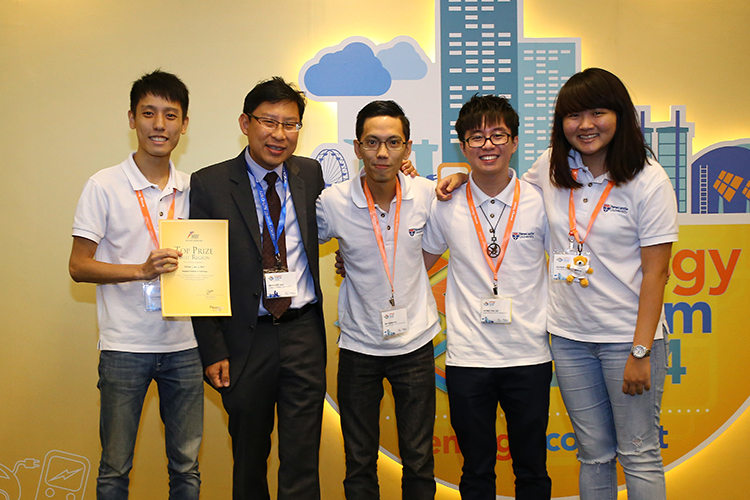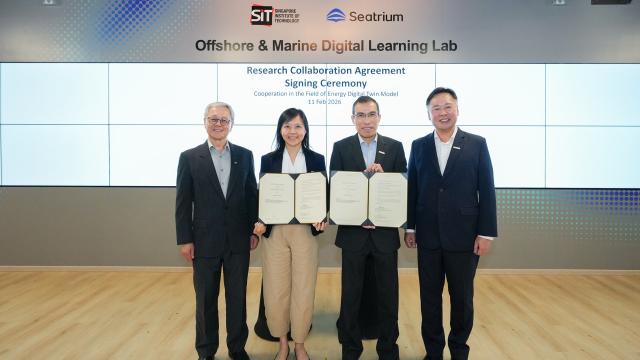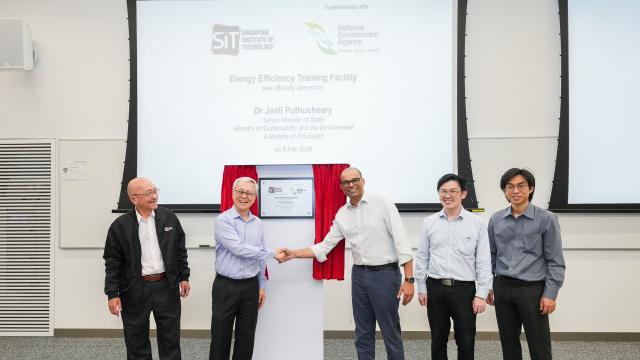SINGAPORE, 6 June 2014 – Four SIT-Newcastle students rose to the occasion and bagged the top prize at ‘Changing the Game’, a role-playing contest that simulates energy policy-making.
Comprising Asher Liao Li Min, Teo Tiong Teck, Ng Keng Fai and Wong Yao Zu, who are all pursuing degrees in the BEng (Hons) Electrical Power Engineering degree programme, the team beat 17 other student groups to win the group category. Notably, Liao and Teo also bagged the top prizes in the Individual category.

SIT-Newcastle students received the top prize for Changing the Game from Bernard Nee, Assistant Chief Executive, Energy Market Authority (second from left) on 6 June 2014. SIT-Newcastle students from left: Teo Tiong Teck, Ng Keng Fai, Wong Yao Zu, Asher Liao Photo | EMA
Organised by Energy Market Authority (EMA) as part of its annual Energy Connect Seminar on 6 June, ‘Changing the Game’ is a role-playing board game which simulates policy-making in the energy arena, allowing participants to influence their energy futures. Each team is made up of four stakeholders – business, citizen, government, and non-government organisation – whose roles are to contribute to the energy policy-making process by evaluating future and present needs. In the competition, each team also has to take into account other considerations such as the need to reduce emissions, diversify fuel supply mix, adopt electric vehicles and trade technologies.
Bernard Nee, Assistant Chief Executive, Energy Planning & Development Division, EMA, explained the importance of ‘Changing The Game’ in his opening address at the energy forum:
“The game is designed to give you a flavour of the trade-offs and considerations that go into policy-making in what is known as the ‘Energy Trilemma’.”
Mr Nee added that energy policy should be one that is balanced on three fronts – namely, energy security, economic competitiveness and environmental sustainability. “There is no single solution that will meet every country’s needs, as the needs of each country vary due to size, population, stage of economic development and natural endowments,” he said.
Wong concurred and shed light on the winning strategy of the SIT team. “Our group ensured that we purchased the required R&D [research & development] at a reasonable price; a price which will benefit us. At the same time, we did not allow the other teams to make a large profit by selling the R&D to us,” he said.
“The best game plan was not to lose points or ‘endanger’ oneself [and one’s team]. In short, staying diversified, affordable and sustainable were the goals we kept in mind throughout the game.”
While Wong attributed the team’s success to team work and luck, Liao believed good communication was crucial to their winning the game. “It was essential to communicate well as we weren’t allowed to know each other’s role in the game; we had to listen out for subtle hints,” he said.
Wong added, “The game taught us to be quick and decisive.”















![[FA] SIT One SITizen Alumni Initiative_Web banner_1244px x 688px.jpg](/sites/default/files/2024-12/%5BFA%5D%20%20SIT%20One%20SITizen%20Alumni%20Initiative_Web%20banner_1244px%20x%20688px.jpg)


